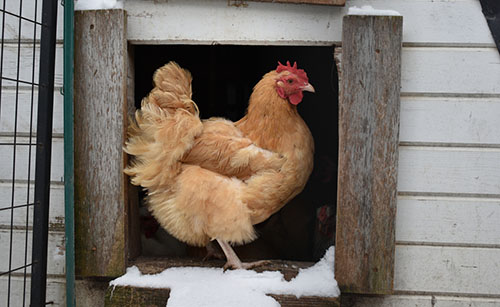Winter Care for your Backyard Chickens
Dec 27, 2021

Your chickens don’t like the cold any more than you do. This time of year, they are often still in the stages of seasonal feather loss and their reproductive systems have taken a rest. Most chickens actually stop laying eggs during molting as they channel all of their available energy and protein into growing out their feathers.
Their increased nutritional needs are often not adequately met due to winter dormancy, which leaves fewer opportunities for your chickens to forage. It may be necessary to supplement your chickens’ diet with extra goodies to keep them healthy through the winter.
With the onset of freezing temperatures come new concerns for maintaining your chickens’ health and weight, but following these helpful tips are sure to keep your flock thriving!
Although winter can be a challenging time, these tried-and-true tips are sure to keep your chickens happy and healthy until spring. For a complete line of poultry supplies such as feed products, supplements, waterers, feeders, and more, visit your local Co-op.
For more content like this, check out the latest issue of the Cooperator.
Their increased nutritional needs are often not adequately met due to winter dormancy, which leaves fewer opportunities for your chickens to forage. It may be necessary to supplement your chickens’ diet with extra goodies to keep them healthy through the winter.
With the onset of freezing temperatures come new concerns for maintaining your chickens’ health and weight, but following these helpful tips are sure to keep your flock thriving!
- Provide access to greens
- Add treats in the coop
- Supplement protein
- Bring on the bugs
- Clear a path
Although winter can be a challenging time, these tried-and-true tips are sure to keep your chickens happy and healthy until spring. For a complete line of poultry supplies such as feed products, supplements, waterers, feeders, and more, visit your local Co-op.
For more content like this, check out the latest issue of the Cooperator.